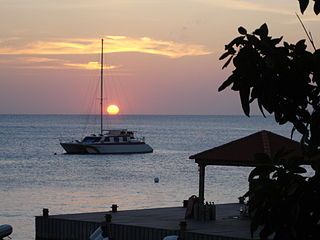If Bonaire Is Going Green, I Want To Help

That is terrific news. Obviously there are other aspects to sustainability, but to boil this down to its essence, we need to examine the trajectory under which they can replace fossil fuels with renewable energy. Of course, this is a discussion that most nations are entertaining, but nowhere is it more acute than on island nations, where energy is expensive (almost exclusively imported diesel), national security is most severely at risk, and the greatest element of GDP (tourism) is also threatened. Is it conceivable that the flow of diesel could be cut off or, at least, become exorbitantly expensive? You bet. Do tourists like fumes belched over them as they’re trying to enjoy the sunset pictured to the left? Nope.
Bonaire most definitely faces the energy security issue, but their name suggests that they may not have the air quality problem. Maybe that’s so. But I was on Bermuda about a year ago, and trust me: when the wind blows the wrong way, the capital city, Hamilton, is coated in a thin but obnoxious layer of a black particulate that comes from those smokestacks — and Bermudians, some of the most affluent (read: “demanding”) people on earth, don’t like it. They’re looking for a solution.
For a combination of these reasons, I’m sure the leaders of Bonaire are nervous about the future, and rightfully so.
Taking this forward requires a brief but important analysis. What exactly is the installed energy infrastructure? How does load vary during the course of the day? The season? What renewable resources are available? At what cost? What social, political, and economic factors come into play?
If you can get me a consulting project that covers my costs and pays me what I could get flipping burgers at McDonald’s, I’ll be happy to engage. This sounds like a really great opportunity.

Having lived in Fiji for 10 years (1994 – 2004), that is a problem with which I am very familiar. At least Fiji was able to get much of its power from a hydro system, but because of insufficient water, it had to depend too much on Diesel power. In some parts of Fiji, Diesel power was all that was available.
In small countries like that, it may be that nuclear power will never be practical or appropriate. Probably they will have to depend on renewable sources backed up by Diesel. It may be that the only practical renewable source will be solar PV because hurricanes can make wind power impractical. It may never be possible to design large wind generators so that they will withstand the periodic hurricanes that beset some small countries, particularly Pacific island nations.
Diesel exhaust can be cleaned up, but doing so increases costs. However, the cost of not cleaning up the exhaust may exceed the cost of cleaning up the exhaust.